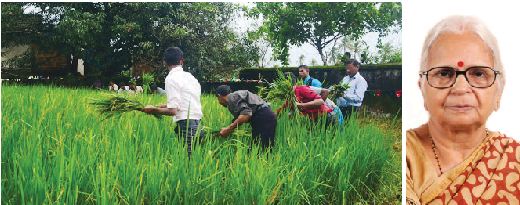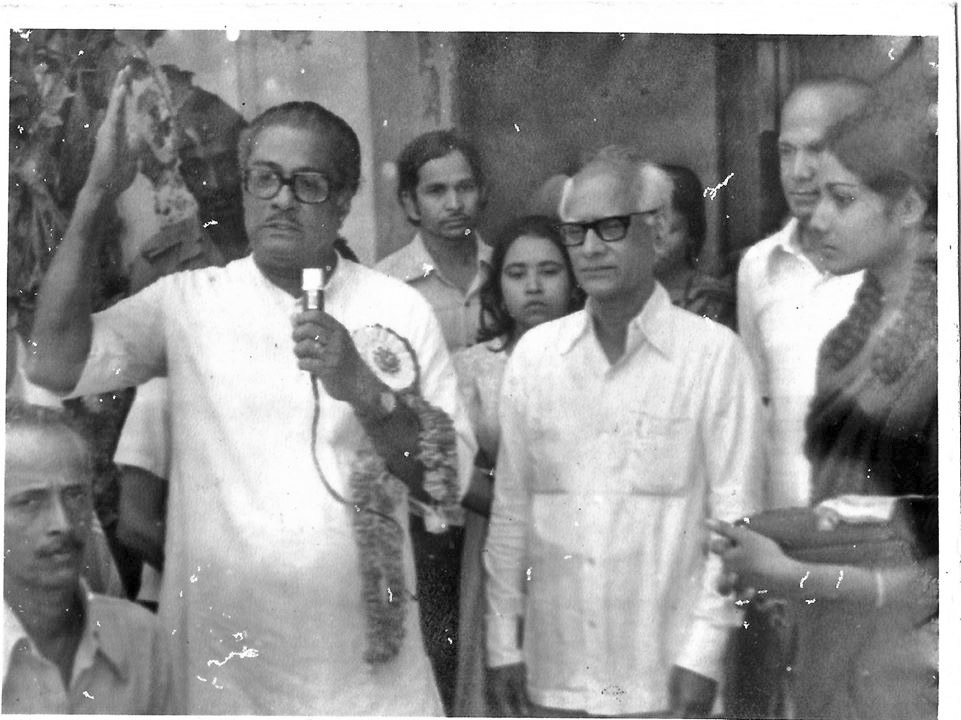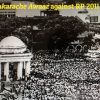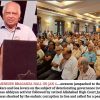Goa is abuzz with excitement as vintage bike and car owners, users, collectors and fans are decking […]

THE TALEIGAO STORY IS WORTH RECOUNTING…
June 20- June 26 2020, Life & Living June 19, 2020A paddy field in Taleigao during harvest festival: Rice has been major staple crop in Goa given its low-lying agricultural fields, The land is not meant for commercial construction, (inset) former Governor of Goa Mridula Sinha took an interest in Goa’s agricultural crisis. Read letter by Taleigao gaonkar and business man Vito Gomes below
By Our Special Correspondent
Urban farming plays a vital role in keeping people happy and healthy, but the small farmers are constantly threatened by development of the concrete kind…
Want to know the true story of Taleigao and how its agricultural land was and is snatched away by politicians in collusion with real estate developers? We’ve come across an interesting account worth recounting because it is the story of post-Liberation Goa when increasingly an educated generation sought white-collared jobs instead of farming for a more secure livelihood…the result was jhat phat urban concrete jungle development.
In recent years some good, but bad and very often ugly kind of urban development has been pushed through mindlessly on a slew of manipulated legislation. So much so that last year when Governor of Goa Mrudula Sinha expressed an interest one old-time resident of Taleigao, businessman and farmer – Vito Gomes — took pains to write a letter to Mridula Sinha (now former governor) about the ongoing plight of a village called Taleigao! We find Vita Gomes letter interesting and reproduce it here in full for whatever good it may do to save the green, green fields of Taleigao. Old, new and future residents of urban spaces must be educated that as the old open agricultural spaces of Taleigao give way to a new high-rise township…between them stand green fields still being painstakingly farmed by residents who believe that farming and loyalty to their forefathers’ agricultural lands comes first!
August24, 2019
His Excellency Mridula Sinha,
It is a great honor to bring to the notice of Your Excellency that our autonomous village of Taleigao stands declared to be in existence since times immemorial belonging to the Gaunkars (aboriginals). The Gaunkars, who first established the village of Taleigao, are governed by unique usages and customs since generations.
It is, again, a great pleasure to bring to your notice that Gaunkars of Taleigao stand solemnly declared as privileged ones by the Portuguese rulers over others at the time of execution of a historical treaty (pact) in the year 1510 AD by the Gaunkars of Goa with the erstwhile rulers. In terms of this treaty, which stands approved by the then King of Portugal, the State guaranteed ‘Administrative Tutelage’ (Guardianship) to the age-old village communities of Goa (Communidade of Goa by Portuguese appellation).
After Liberation of Goa from Portuguese rule in 1961, the existence of Communidades or the Village Communities of Goa is not seen under the Constitution of India. There are about 223 autonomous villages belonging to Gaunkar communities spread across Goa. These Communidades or village communities ought to have been recognized as being unique establishments and living heritage of India by making suitable amendment under Article 244 of the Constitution of India guaranteeing them protection against exploitation by vested interests.
By virtue of the above-said treaty of 1510, the Gaunkars of Taleigao are automatically privileged to begin the harvesting of the first corn of rice in Goa followed by the rest of the villages. In year (2010), the Taleigao Communidade completed 500 glorious years of keeping alive the tradition of harvesting the paddy crop and the first corn of rice.
Equally honoured are the nine Gaunkar families namely Mendonca, Viegas, Martins, Luis, Gomes, Faria, Almeida, Falcao and Abreu that constitute the age-old village community of Taleigao. These families have over the years commemorated the tradition in the form of a feast that is celebrated on a rotational basis on August 21st every year. This year, we, the Gomes family, are delighted to be the main celebrants of this traditional feast.
Your Excellency, while commemorating this great occasion, we would like to place the apprehensions and concerns faced by the Gaunkars and other agricultural communities of Taleigao, who are mostly poor. These communities depend solely on agriculture. It is with regret we add that there has been systematic deterioration of the paddy fields caused by various agencies of the State Government in the name of development in collusion with politicians. These politicians have neither taken consent of Gaunkars nor of poor farmers before carrying out development that we call ‘destructive’.
We would like to place before you a very humble fact and now probably forgotten that Taleigao was once known as the rice granary of Goa. Besides being the backbone of rice cultivation in the State, it had the distinct honour of growing several kinds of local vegetables and fruits that were sold in the open market. It had a dense cover of coconut trees and other fruit-bearing trees such as mangoes, tamarind, etc., which are now a rarity. We would also like to strongly point out that the paddy-growing fields, some of which have been filled and some inundated with sewage, are low lying. These were maintained by Gaunkars who provided the best irrigation system to the agriculturists and amelioration to the farmers.
The Gaunkars and the agricultural community in Taleigao are now victims of constant acquisition of low-lying paddy fields and other land for construction of roads that don’t fall within the purview of development. In some places land is filled to facilitate various kinds of constructions in the name of public interest. There is nothing that has happened or will neither happen in the interest of Gaunkars nor of the agricultural community. All that’s happening is for vested interests of politicians who have nexus with builders. We have reviewed the developments and conclude, in some cases with legal proof, that the so- called acquisitions of the Communidade land by the State are illegal. We firmly assert the State has infringed on the age-old tradition of a “private village” and made a mockery of the institution.
Sadly, the illegalities perpetrated by the State have cost the Gaunkars and the agricultural community dearly because these were forced to give up cultivation on account of high maintenance costs. As a result some of the Communidade land lies fallow in the absence of a suitable irrigation and all this because of illegal constructions like roads and buildings.
To be more descriptive, the State and the village panchayat have failed to provide neither sewage nor drainage system in the village of Taleigao. Raw sewage overflowing from the septic tanks attached to unplanned residential buildings and discharge of untreated waste water around the low lying fields is a common site. This is precisely the reason farmers have given up cultivation of paddy for good.
The revenue authorities — the Collector, the Town & Country Planning authorities and the Village Panchayat — are illegally exercising their powers to permit illegalities. We urge Your Excellency to exercise powers vesting in you by the Law of Communidades to direct these authorities to undo the damage caused so far and not to interfere in the functioning of autonomous villages.
At this juncture, we bring to the notice of Your Excellency the Revenue Ministers of the Governments concerned since May 1987 have encroached upon the powers of the Governor of the State. These powers were conferred by consent of the Gaunkars concerned at the relevant point in time in pursuance of the age-old treaty. Another important point we would like to highlight is the erstwhile Portuguese administration first tried to regulate these prevailing practices and customs in the Foral (Charter) of 1526, further attempts made in the regimentos of 1735 and 1871 followed by the Decreto of 1880 and the Codigo of 1905 reframed in 1933.
The requirements and demands of the political rulers, as reflected by the aspirations of the people that came to populate this place, led to a new version of the Code that was finally adopted on 15.04.1961 and is currently in force, commonly referred to as Legislative Diploma 2070 dated 15.06.1961.
In the past, number of committees, including one House committee of the Goa legislative Assembly, have been engaged in assessing and making observations on the relevance and viability of the Communidade, in present times, this was mandated by the Hon.High
Court in terms of petition 406 of 2009, to review and assess the status of these bodies, in the context of existing revenue and other agrarian laws, that have come into force in the state from time to time, in the last 50 years as a sequel to the political direction, post liberation. This commission has yet to see light of the day as of now.
Citing all of the above we are apprehensive that ‘Administrative Tutelage’ (guardianship) guaranteed to us by the State to protect our land, usage and customs, our private law as well as our privileges will not be protected. We have been left to the mercy of plunderers whose acts are supplemented by politicians with vested interests. This, we say, because the Administrator of Communidades appointed by politicians functions against the interest of Gaunkars and turns a blind eye to the omissions and commissions of his subordinates.
We, the Gaunkars, once again humbly request Your Excellency to assume the powers and authority conferred by the provisions of the private law on the Governor of the State to arrest further deterioration of the once much-avowed Taleigao Communidade at the hands of the several State organs. The State Government is not the landlord of the Communidades and as such it becomes important to restrain the revenue authorities and local bodies from intrusion into non-revenue villages.
The Gaunkars are extremely grateful you spared valuable time to hear our concerns and grievances and on this occasion we wish Your Excellency good health and strength to succeed in all your future endeavors.
Best Regards,
Vito Gomes
(Note: Vito Gomes is a Taleigao native who owns and operates a global aviation services company based in Dubai, he divides his time equally between Dubai and his home village Taleigao looking after his family fields. Like other farmers he too is worried that his fields will be affected by the continuing boom in irrational construction on agricultural fields. The fields, he says, define an over 200 years old memory of rich heritage, history and culture of the village of Taleigao, how can agricultural fields be acquired in the name of development to build roads — to facilitate commercial construction activity? Interestingly, Taleigao’s Progressive Farmers Group lists at least 60 members with nearly 20 members owning fields. The group motivates and takes up the cause of farming even as an undesirable and unhealthy kind of urban development stares them in the face.)
Remember the story of Revolution Day
(which we celebrate every June 18)….
Goa Team
On June 15, 1946, Dr Juliao Menezes and Dr Ram Manohar Lohia organized a public meeting in Panaji. The meeting was an act of civil disobedience. There was a ban on public meetings imposed by the then Portuguese government. However, much to their surprise, this public meeting was tolerated by the colonial rulers. Then on June 18, Dr Ram Manohar Lohia along with Dr Juliao Menezes entered Margao Square riding in a horse carriage. Thousands of people had gathered there to welcome them. The grand entrance is said to have been greeted with slogans such as “Dr Lohia-ki-Jai, Dr Juliao Menezes-ki-Jai!”
The turnout was so huge that it became difficult for the police to handle. To avoid untoward incidents and any unrest the duo, Dr Lohia and Dr Menezes, were arrested. The reaction of the public was this is unacceptable and people began to protest in large numbers. They demanded that Dr Lohia and Dr Menezes be released from prison. The police failed to dispersed the crowd. This left the government with no choice but to release Dr Lohia and Dr Menezes. After his release, Dr Lohia was asked to leave Goa. And June 18 came to known as Revolution Day in Goa from then onwards and its Liberation in 1961, in honor of all the stalwarts responsible for this feat, the road was named 18th June road. This day is celebrated every year in Goa by the Goa government and the people of Goa.
Meenacshi Martins shares her memories of Revolution Day history…

For us as children, back when, with little knowledge of the significance of the struggle or the price our families had paid before our birth, 18th June remained a picnic day at Central Jail of Aguada. The stories of the Jail term spent by my father Dr. Jose Francisco Xavier Antonio Martins and his associates in the freedom movement was neatly camouflaged into little funny tales, that later on in years changed into narratives of learning and education and up liftment of all the youth who had to let go of formal education in service of their mother land.
My father, fluent in Portuguese, English, French, German and Latin, taught others. While Adv Pandurag Mulgaonkar taught my father Marathi and Sanskrit. (which later he taught me and my son)
They all cooked together and there are all sorts of funny stories about men who had never cooked in their lives trying their culinary arts and that too for dozens of inmates in tiny kitchens attached to their tiny crowded cells..
My father became good at baking muffins and making trifle puddings. He also made pickle with Jaggery from the limes in my grandma’s front yard. Goan limes are big and juicy. Till date I make the pickle and remember the stories from Jail that were told while my father, later made this pickle at home.
In the most intriguing moment, my father was called by his old room mate to make fruit salad for his son’s wedding. “no caterer would make it as good as my father could”, that man said. My father a famous physician and a freedom fighter just folded the sleeves of his kurta and got down to chopping fruits and preparing custard in the full mode of the central jail kitchen. I sat by and watched him while I munched on chikoos.
The pain was all but hidden. I never had the courage to ask how he felt when he was arrested early in the morning. Never occurred to me to question why had he not ran away when he knew that he would be arrested the next morning. More so because he had a father dying of bone cancer.
Once he mentioned that they were given only one bottle to urinate and use for toilet and drink water from, while they were housed in the initial trial phase, in the building constructed for the mental hospital. I never asked anything further… but always got a tight knot in the stomach to hear bits and parts of those stories.
His most favorite stories were of the kitten he had picked up from the ship that came from Portugal. He had called it Ramu and the prison had let him bring the cat home on his release after serving nearly 5 years in jail of his life term. My mother then called the cat, Joaquim, and he remained our loving companion for 14 years.
The only time I saw tears roll down my father’s face was when we buried Ramu under a coconut tree. Remember this spot my father said. Ramu takes a huge part of my history with him.
18th June is an emotional affair. With hardly anyone left to heed the emotional weight of the event, I stopped attending the ceremony. Going to the rooms of the inmates which were kept empty till mid-80s and bending in obeisance, lighting lamps to honor their extreme sacrifice and then having a lunch in the jailor’s office area. Every year till early 80s when my mother got glass in her foot out side the jail while we waited for the bus to arrive and then that’s another story.
Till then much respect to all those jail mates of my father who I grew up thinking of as family and who raised me in their homes and looked after me while my parents set up their medical practice. My deepest gratitude. There were hardly anyone left of that tribe today. Their valor and their strength is what we, the gene holders shall carry for this life time.
Till memories fade and histories are rewritten and distorted; while we are still alive, let us pay respect to all the sacrifice and honour that went into freeing Goa from Colonial forces.
Hope the next generation remember something.
(Courtesy facebook. Meenacshi Martins is a woman of many parts, an actor, psychiatrist, story-teller with many memoirs)














